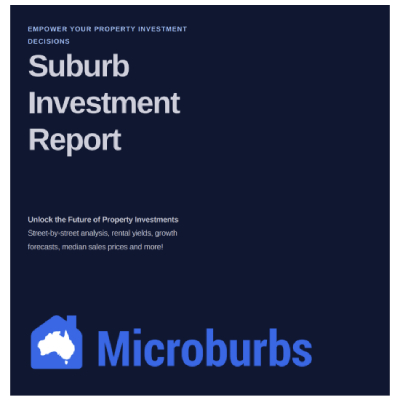Choosing the best city to live in Australia can be as baffling as trying to understand the rules of cricket. Selecting the wrong place might lead to higher living costs, fewer job opportunities, or simply an unsuitable lifestyle. Fortunately, we’ve done the research for you, evaluating the cities based on 10 criteria to bring you the most comprehensive list you’ll find this side of the Nullarbor.
10. Hobart – 72/100
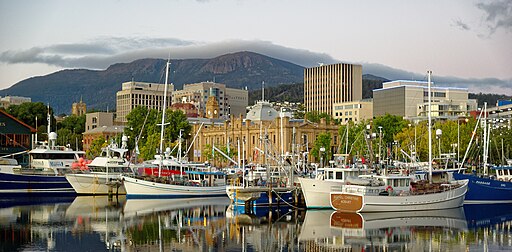
Hobart, with its vibrant arts scene and stunning natural beauty, struggles with housing affordability and limited job opportunities.
Scoring Criteria:
- Affordability: 5/10
- Employment Opportunities: 6/10
- Education: 8/10
- Healthcare: 8/10
- Safety: 9/10
- Public Transport: 7/10
- Lifestyle: 9/10
- Climate: 7/10
- Natural Environment: 10/10
- Cultural Diversity: 3/10
Hobart, the capital of Tasmania, boasts some of the most picturesque landscapes in Australia, a thriving arts community, and a strong sense of community. The city is surrounded by pristine wilderness, like Mount Wellington and the stunning Bruny Island. Hobart’s low crime rate and excellent education options make it a great place for families.
However, Hobart faces challenges in housing affordability and limited job opportunities, particularly in specialised industries. The city’s cultural diversity is also limited compared to other Australian cities.
Hobart may be the perfect fit for those who value a slower-paced lifestyle, surrounded by nature and a strong sense of community, but are prepared to compromise on job opportunities and cultural diversity.
Interested in Hobart?
If you want to know more about Hobart, including:
- Capital growth potential
- Local amenities
- Current development applications
- Noise pollution
- Street-by-street liveability analysis
You can get all that and more in the Microburbs Suburb Insight Report.
9. Adelaide – 73/100
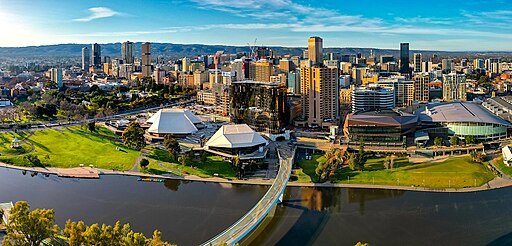
Adelaide offers a relaxed lifestyle, high-quality education, and affordable housing, but it falls behind in terms of cultural diversity and public transport.
Scoring Criteria:
- Affordability: 8/10
- Employment Opportunities: 7/10
- Education: 9/10
- Healthcare: 8/10
- Safety: 8/10
- Public Transport: 6/10
- Lifestyle: 8/10
- Climate: 7/10
- Natural Environment: 7/10
- Cultural Diversity: 5/10
Adelaide, known as the ‘City of Churches,’ is a peaceful city with a relaxed pace of life, making it an ideal choice for young families. The city has some of the country’s top universities, including the University of Adelaide and Flinders University. Housing prices are comparatively lower than other major cities, offering first-time homebuyers more bang for their buck.
On the downside, Adelaide’s cultural diversity is limited, and its public transport system leaves something to be desired. The city has a warm Mediterranean climate, but it can get quite hot during summer months.
Adelaide is a great choice for young couples seeking a laid-back lifestyle with a focus on family and education, but they should be prepared to compromise on cultural diversity and public transport options.
Interested in Adelaide?
If you want to know more about Adelaide, including:
- Capital growth potential
- Local amenities
- Current development applications
- Noise pollution
- Street-by-street liveability analysis
You can get all that and more in the Microburbs Suburb Insight Report.
8. Gold Coast – 74/100
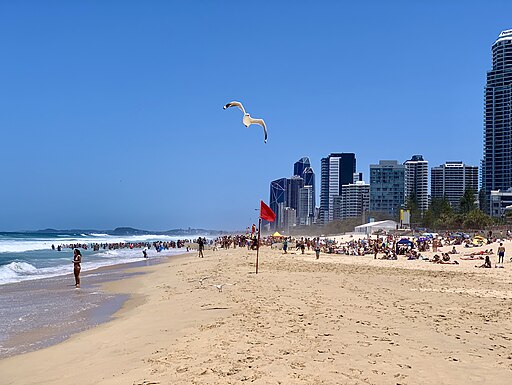
The Gold Coast is known for its stunning beaches, outdoor activities, and vibrant nightlife, but struggles with employment opportunities and public transport.
Scoring Criteria:
- Affordability: 6/10
- Employment Opportunities: 6/10
- Education: 8/10
- Healthcare: 9/10
- Safety: 8/10
- Public Transport: 6/10
- Lifestyle: 10/10
- Climate: 8/10
- Natural Environment: 9/10
- Cultural Diversity: 4/10
The Gold Coast is the ultimate playground for sun-seekers, surfers, and adventurers. The city offers world-class beaches, theme parks, and endless outdoor activities. The nightlife is lively, and the city hosts a range of events and festivals throughout the year.
However, the Gold Coast faces challenges with employment opportunities, particularly in industries beyond tourism and
hospitality. The city’s public transport system is also limited, making it difficult for residents to move around without a car. The cultural diversity in the Gold Coast is less than what you’ll find in larger cities.
The Gold Coast is an ideal fit for young couples who prioritize an active lifestyle and love being near the beach. However, they should be prepared to face challenges in finding employment opportunities in certain industries and rely on personal transportation.
Interested in Gold Coast?
If you want to know more about Gold Coast, including:
- Capital growth potential
- Local amenities
- Current development applications
- Noise pollution
- Street-by-street liveability analysis
You can get all that and more in the Microburbs Suburb Insight Report.
7. Canberra – 75/100
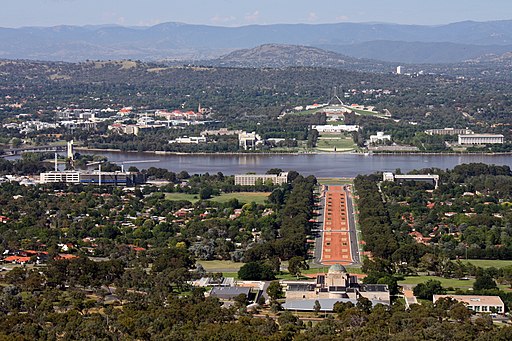
Canberra, Australia’s capital, offers strong job prospects and education, but has a higher cost of living and less vibrant nightlife.
Scoring Criteria:
- Affordability: 6/10
- Employment Opportunities: 9/10
- Education: 9/10
- Healthcare: 8/10
- Safety: 8/10
- Public Transport: 7/10
- Lifestyle: 6/10
- Climate: 6/10
- Natural Environment: 8/10
- Cultural Diversity: 8/10
Canberra, a planned city and the political heart of Australia, offers excellent job opportunities, particularly in government and IT sectors. The city is home to renowned educational institutions such as the Australian National University and the University of Canberra.
However, the cost of living in Canberra is higher compared to other cities on this list, and the nightlife is not as vibrant. The city experiences hot summers and cold winters, which may not suit everyone.
Canberra is a great choice for young couples seeking stable employment and access to quality education, but they should be prepared to compromise on the cost of living and a less exciting nightlife.
Interested in Canberra?
If you want to know more about Canberra, including:
- Capital growth potential
- Local amenities
- Current development applications
- Noise pollution
- Street-by-street liveability analysis
You can get all that and more in the Microburbs Suburb Insight Report.
6. Perth – 76/100
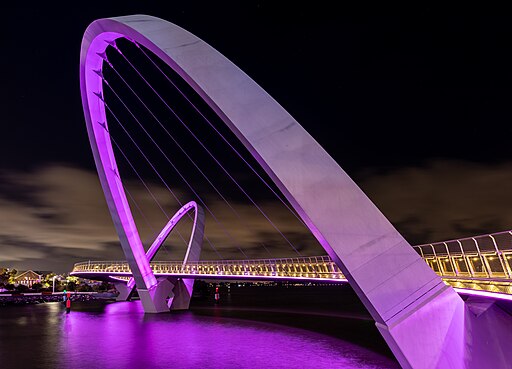
Perth offers a relaxed lifestyle and beautiful beaches, but is isolated from other major cities and has a limited public transport system.
Scoring Criteria:
- Affordability: 7/10
- Employment Opportunities: 7/10
- Education: 8/10
- Healthcare: 8/10
- Safety: 8/10
- Public Transport: 6/10
- Lifestyle: 8/10
- Climate: 8/10
- Natural Environment: 9/10
- Cultural Diversity: 7/10
Perth, the capital of Western Australia, is known for its laid-back lifestyle, stunning beaches, and beautiful parks. The city has a thriving mining industry, providing ample job opportunities in the resources sector.
However, Perth is geographically isolated from other major cities in Australia, which may make it difficult for residents to travel for work or leisure. The public transport system in Perth is limited, making it essential to own a car.
Perth is an excellent choice for young couples who love the beach and a relaxed lifestyle, but they should be prepared to deal with limited public transport options and the city’s isolation from other major urban centres.
Interested in Perth?
If you want to know more about Perth, including:
- Capital growth potential
- Local amenities
- Current development applications
- Noise pollution
- Street-by-street liveability analysis
You can get all that and more in the Microburbs Suburb Insight Report.
5. Brisbane – 78/100
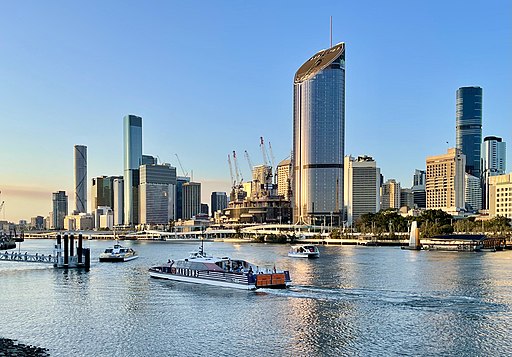
Brisbane boasts a warm climate, affordable housing, and a growing job market, but its public transport system could use improvement.
Scoring Criteria:
- Affordability: 8/10
- Employment Opportunities: 8/10
- Education: 8/10
- Healthcare: 8/10
- Safety: 8/10
- Public Transport: 6/10
- Lifestyle: 8/10
- Climate: 9/10
- Natural Environment: 8/10
- Cultural Diversity: 7/10
Brisbane, the capital of Queensland, offers a warm subtropical climate, affordable housing, and a growing job market in various industries. The city is home to multiple universities, including the University of Queensland and Queensland University of Technology.
The main downside to living in Brisbane is its public transport system, which is less extensive than those in other major cities. Additionally, the city’s cultural diversity is not as rich as cities like Melbourne or Sydney.
Brisbane is a great option for young couples seeking a warm climate, affordable housing, and a growing job market, but they should be prepared for a less than optimal public transport system and a slightly less diverse cultural scene.
Interested in Brisbane?
If you want to know more about Brisbane, including:
- Capital growth potential
- Local amenities
- Current development applications
- Noise pollution
- Street-by-street liveability analysis
You can get all that and more in the Microburbs Suburb Insight Report.
4. Geelong – 79/100
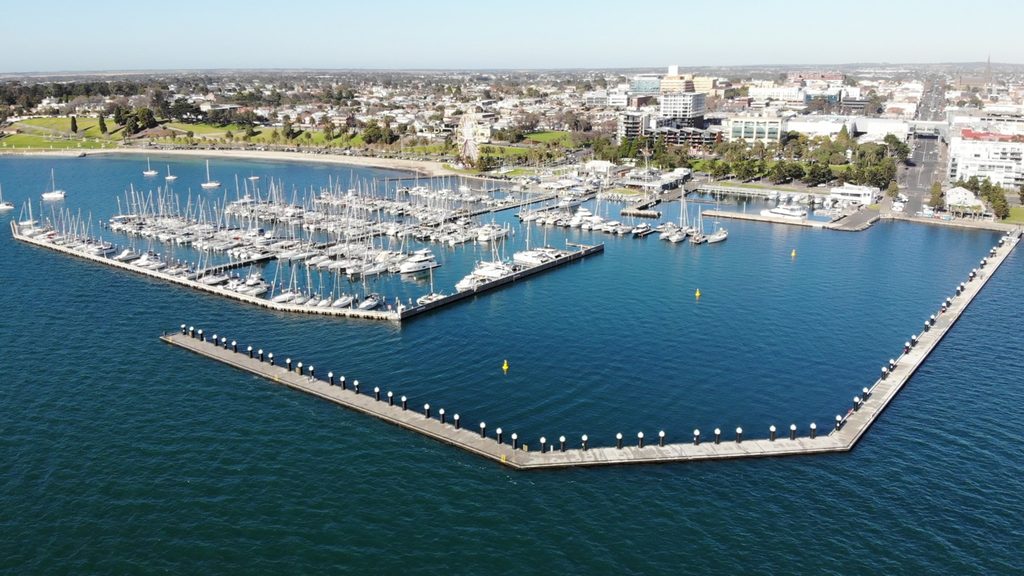
Geelong offers affordable housing and a relaxed lifestyle, but has fewer job opportunities compared to larger cities.
Scoring Criteria:
- Affordability: 9/10
- Employment Opportunities: 7/10
- Education: 8/10
- Healthcare: 8/10
- Safety: 8/10
- Public Transport: 7/10
- Lifestyle: 9/10
- Climate: 8/10
- Natural Environment: 8/10
- Cultural Diversity: 7/10
Geelong, located near Victoria’s Surf Coast, offers a relaxed lifestyle with easy access to beautiful beaches and nature reserves. The city has affordable housing options and a growing education sector, including Deakin University’s Geelong campus.
However, Geelong has fewer job opportunities compared to larger cities, and its cultural diversity is not as vast. Public transport options are available, but they are not as extensive as those in major cities like Melbourne or Sydney.
Geelong is an excellent choice for young couples seeking affordable housing and a relaxed lifestyle, but they should be prepared to face fewer job opportunities and a less diverse cultural scene.
Interested in Geelong?
If you want to know more about Geelong, including:
- Capital growth potential
- Local amenities
- Current development applications
- Noise pollution
- Street-by-street liveability analysis
You can get all that and more in the Microburbs Suburb Insight Report.
3. Melbourne – 81/100
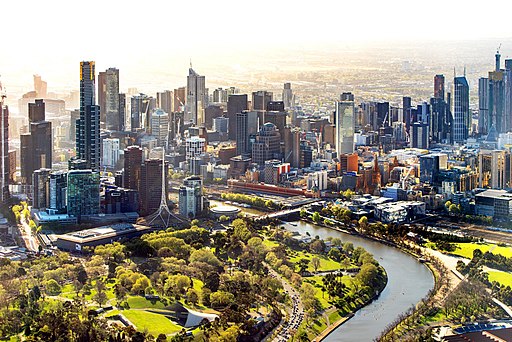
Melbourne is known for its arts, culture, and food scene but struggles with housing affordability and public transport.
Scoring Criteria:
- Affordability: 6/10
- Employment Opportunities: 8/10
- Education: 9/10
- Healthcare: 9/10
- Safety: 8/10
- Public Transport: 7/10
- Lifestyle: 10/10
- Climate: 7/10
- Natural Environment: 8/10
- Cultural Diversity: 9/10
Melbourne, the capital of Victoria, is famous for its arts, culture, and food scene. The city is home to prestigious universities, such as the University of Melbourne and Monash University, and has a thriving job market in various industries.
However, Melbourne struggles with housing affordability, and its public transport system can be overcrowded during peak hours. The city’s climate is also known for being unpredictable, often experiencing four seasons in one day.
Melbourne is an ideal choice for young couples who value arts, culture, and a diverse food scene, but they should be prepared for higher housing costs and a sometimes challenging public transport system.
Interested in Melbourne?
If you want to know more about Melbourne, including:
- Capital growth potential
- Local amenities
- Current development applications
- Noise pollution
- Street-by-street liveability analysis
You can get all that and more in the Microburbs Suburb Insight Report.
2. Sydney – 83/100
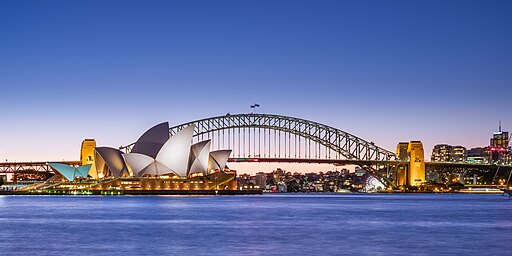
Sydney offers a strong job market and beautiful beaches, but housing affordability remains a significant concern.
Scoring Criteria:
- Affordability: 5/10
- Employment Opportunities: 9/10
- Education: 9/10
- Healthcare: 9/10
- Safety: 8/10
- Public Transport: 8/10
- Lifestyle: 9/10
- Climate: 8/10
- Natural Environment: 9/10
- Cultural Diversity: 9/10
Sydney, Australia’s largest city, offers a strong job market, world-class beaches, and a vibrant cultural scene. The city is home to top universities, including the University of Sydney and the University of New South Wales.
However, Sydney is notorious for its high housing costs, making it difficult for young couples to enter the property market. While the public transport system is extensive, it can be congested during peak hours.
Sydney is a great option for young couples who value career opportunities and a lively lifestyle, but they should be prepared for high housing costs and occasional public transport challenges.
Interested in Sydney?
If you want to know more about Sydney, including:
- Capital growth potential
- Local amenities
- Current development applications
- Noise pollution
- Street-by-street liveability analysis
You can get all that and more in the Microburbs Suburb Insight Report.
1. Wollongong – 85/100
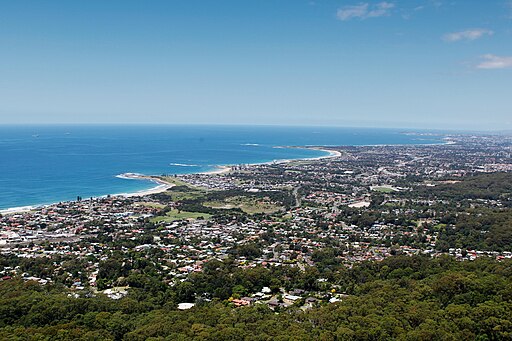
Wollongong combines affordable housing, job opportunities, and stunning natural surroundings but has a less diverse cultural scene.
Scoring Criteria:
- Affordability: 8/10
- Employment Opportunities: 8/10
- Education: 9/10
- Healthcare: 9/10
- Safety: 8/10
- Public Transport: 7/10
- Lifestyle: 10/10
- Climate: 9/10
- Natural Environment: 10/10
- Cultural Diversity: 6/10
Wollongong, located on the scenic New South Wales coast, offers a unique blend of affordable housing, job opportunities, and stunning natural surroundings. The city is home to the University of Wollongong, a well-regarded institution, and boasts an expanding healthcare sector.
However, Wollongong’s cultural scene is not as diverse as larger cities like Sydney or Melbourne. Public transport options are available, but they are not as extensive as those in major cities.
Wollongong is an ideal choice for young couples who desire a balance between affordability, job opportunities, and natural beauty. However, they should be prepared for a less diverse cultural scene and limited public transport options.
Interested in Wollongong?
If you want to know more about Wollongong, including:
- Capital growth potential
- Local amenities
- Current development applications
- Noise pollution
- Street-by-street liveability analysis
You can get all that and more in the Microburbs Suburb Insight Report.
How I scored each city
In this section, you’ll learn about the 10 criteria used to score the cities and why they were deemed essential factors in our ranking.
Affordability
Affordability measures the cost of living, including housing prices and general expenses. This factor is crucial for young couples seeking to establish their lives without breaking the bank. A city scoring 1 on this criterion would have exorbitant housing costs and daily expenses, such as an exclusive suburb like Point Piper in Sydney. On the other hand, a city with a score of 10 would offer affordable housing options and reasonable living costs, like a regional town such as Bendigo.
Employment Opportunities
Employment opportunities assess the availability and diversity of jobs in a city, which is vital for young couples to build their careers and financial stability. A city scoring 1 in this criterion would have limited job opportunities and a stagnant economy, like a remote mining town experiencing an industry downturn. A city with a score of 10 would have a thriving job market across various industries, like a rapidly growing regional hub such as Ballarat.
Education
Education is an essential criterion because it determines the quality of schools and higher education institutions available in a city. A city scoring 1 would have limited educational options and lower-quality institutions, like a small rural town with minimal access to schools and tertiary education. A city scoring 10 would be home to prestigious universities and excellent schools, such as a major city with several top-ranked institutions, like Canberra.
Healthcare
Healthcare assesses the availability and quality of medical services in a city. It is an essential factor for young couples, who may be considering starting a family or managing existing health concerns. A city scoring 1 would have limited healthcare facilities and longer waiting times, like a remote town with only a small medical clinic. A city scoring 10 would have world-class hospitals and healthcare services, like a major metropolitan area with multiple renowned hospitals, such as Brisbane.
Safety
Safety measures the crime rates and overall sense of security in a city. A city scoring 1 would have high crime rates and a general feeling of insecurity, like an area struggling with social and economic challenges. A city with a score of 10 would provide a secure environment with low crime rates, like a well-planned and well-governed city, such as Adelaide.
Public Transport
Public transport evaluates the availability and efficiency of transport options in a city. A city scoring 1 would have limited public transport options and unreliable services, like a remote town with infrequent bus connections. A city scoring 10 would have a well-developed and efficient public transport system, like a major city with an extensive network of trains, trams, and buses, such as Perth.
Lifestyle
Lifestyle measures the overall quality of life in a city, taking into account factors like recreational facilities, entertainment options, and access to amenities. A city scoring 1 would have limited options for leisure and entertainment, like a small town with minimal facilities. A city scoring 10 would provide a rich and diverse range of lifestyle opportunities, like a vibrant metropolitan area with numerous cultural, sporting, and culinary attractions, such as Hobart.
Climate
Climate evaluates the overall weather conditions and comfort levels in a city. A city scoring 1 would have harsh weather conditions, such as extreme temperatures or frequent severe weather events, like a remote desert town. A city scoring 10 would enjoy a comfortable and mild climate with pleasant temperatures year-round, like a coastal city with a Mediterranean climate, such as Fremantle.
Natural Environment
The natural environment assesses the availability of green spaces, parks, and natural attractions in a city. A city scoring 1 would have limited access to nature and few green spaces, like a heavily industrialized urban area. A city scoring 10 would have abundant access to parks, forests, and natural attractions, like a coastal city surrounded by national parks and picturesque landscapes, such as Cairns.
Cultural Diversity
Cultural diversity measures the presence of different cultures and ethnicities in a city, which contributes to its vibrancy and sense of community. A city scoring 1 would have limited cultural diversity and few opportunities to experience different cultures, like a small, homogeneous rural town. A city scoring 10 would be a melting pot of cultures, offering a rich tapestry of experiences and fostering an inclusive atmosphere, like a cosmopolitan city with a diverse population, such as Darwin.
Conclusion
Each city offers a unique mix of qualities that make them attractive to young couples, ranging from affordability and employment opportunities to lifestyle and natural environments. By using our comprehensive scoring criteria, we have provided a well-rounded analysis of the best cities in Australia for young couples to live.
- Wollongong (Score: 85/100)
- Sydney(Score: 83/100)
- Melbourne (Score: 81/100)
- Geelong (Score: 79/100)
- Brisbane (Score: 78/100)
- Perth (Score: 76/100)
- Canberra (Score: 75/100)
- Gold Coast (Score: 74/100)
- Adelaide (Score: 73/100)
- Hobart(Score: 72/100)
If you require assistance in finding a suitable property in one of these top suburbs, consider engaging the services of a professional residential buyer’s agent. They can help you navigate the property market and secure a home that meets your needs and preferences.
Interested in somewhere more specific around Australia
Try the Best 10 Cities to Live in New South Wales
Try the Best 10 Cities to Live in Victoria
Try the Best 10 Cities to Live in Queensland
Try the Best 10 Cities to live in South Australia
Try the Best 10 Cities to live in Western Australia
Try the Best 10 Cities to live in the Northern Territory
